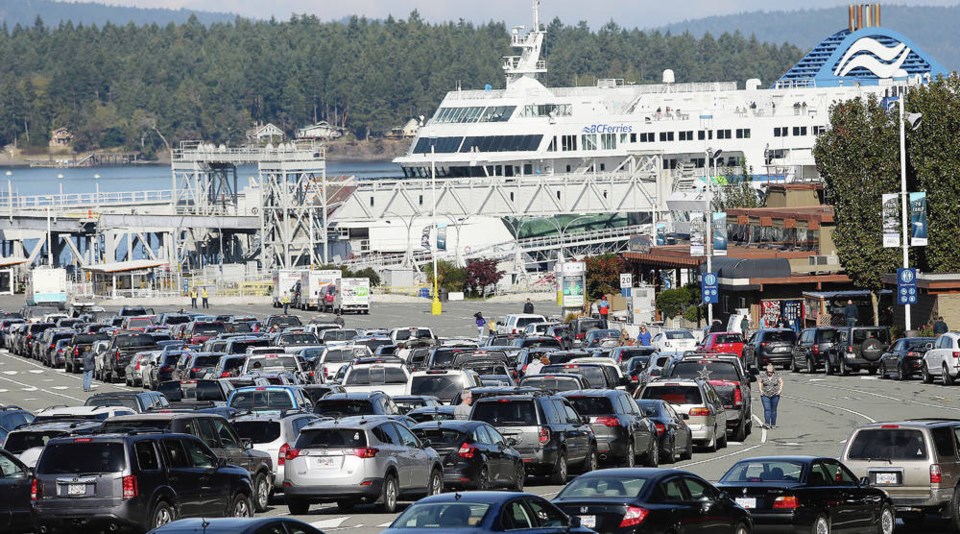B.C. Ferries’ latest financial report shows the impact of six months of pandemic-related declines in passenger and vehicle numbers.
From April 1 to Sept. 30, net losses totalled $24.2 million — compared to net earnings of $107.2 million in the same period in 2019, a decline of $131.4 million.
B.C. Ferries’ net earnings for the second quarter, the three months ending Sept. 30, came in at $37.8 million — down $57 million from the same period last year.
Released Friday, the second-quarter report includes the previous three months, since the new fiscal year began on April 1, shortly after COVID-19’s impact was felt globally.
And there is no reprieve on the horizon — British Columbians were asked this week to avoid non-essential travel as case counts rise.
The company is also dealing with the fallout of Transport Canada’s decision to rescind permission — granted early in the pandemic — for passengers to remain in their vehicles on lower car decks during travel, to limit their exposure to other passengers. Premier John Horgan spoke out against the decision, which came into effect on Sept. 30, but so far, it’s still in effect.
More than 1,000 non-compliance incidents have been reported to Transport Canada, said Mark Collins, B.C. Ferries’ president and chief executive, who did not have information on any federal action.
Under federal rules, Transport Canada can issue fines of between $600 and $12,000 to a passenger refusing to leave an enclosed deck. An additional fine of between $600 and $2,400 can be issued for not following directions from ship crew members to leave the deck.
Collins said one case of non-compliance would likely just trigger a letter from Transport Canada.
Crews make three tours of lower decks during sailings and police are making random visits as well.
Collins said one passenger who was unhappy with being told to leave his vehicle shoved a crew member into a bulkhead.
B.C. Ferries has the ability to ban non-compliant passengers from its vessels for varying lengths of time, including an indefinite ban.
Buffets remain shut and B.C. Ferries is looking at using that space to free up more room for passengers, Collins said. It’s also examining where seating can be added outdoors, with some kind of protection from rough weather.
Along with continued enhanced cleaning, B.C. Ferries is examining the possibility of upgrading its ventilation system, to help improve air quality.
In September, the federal and provincial governments threw B.C. Ferries a $308-million lifeline under the Safe Restart Funding Program. Collins said he is grateful for those funds, which will provide stability to the ferry service.
During the past quarter, B.C. Ferries carried 5.5 million passengers and 2.5 million vehicles, a decrease of 29 per cent and 14 per cent respectively from a typical year.
In the first six months of this fiscal year, B.C. Ferries carried 7.7 million passengers and 3.8 million vehicles, a drop of 43 per cent and 28.7 per cent from 2019.
On Wednesday, passenger traffic was down by 44 per cent and vehicle numbers were down by 30 per cent from normal levels, Collins said.
Earlier in the pandemic, B.C. Ferries imposed a 25 per cent reduction in passenger capacity as a safety move.
The corporation also chopped operational expenses by 14 per cent, or $62 million, for the first six months of the fiscal year, through reductions in fuel use, contracted services, labour, maintenance, advertising and more.
It’s now reviewing its capital program for additional savings. Collins said plans have been deferred for five years to order four new major vessels, which would have cost about $800 million. Instead, more intensive refits are planned to extend the lifespans of the Queen of Coquitlam, the Queen of Cowichan, the Queen of Alberni and the Queen of New Westminister.
“It’s imperative that we scrutinize everything we do to preserve the long-term sustainability of the ferry system in the public interest,” Collins said.
cjwilson@timescolonist.com



